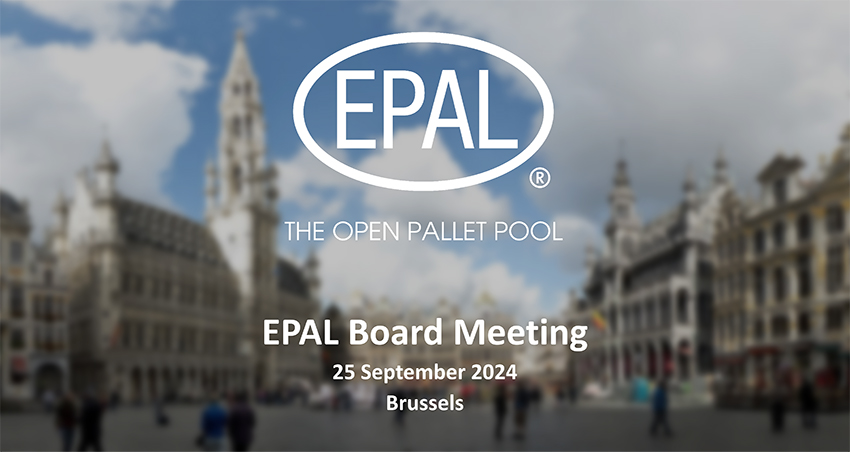EPAL Board Meeting and strategy workshop on 24/25 September 2024 in Brussels
EPAL Board Meeting and strategy workshop on 24/25 September 2024 in Brussels
The EPAL Board met for its third meeting in 2024 in Brussels on 24/25 September 2024. Part of the board meeting was a workshop on the development of EPAL's strategy for the next years. The Board also discussed the next steps in the development of the EPAL QR Euro Pallet.
EPAL was founded in 1991 to bundle the activities of national associations, which have been responsible for the quality assurance of Euro pallets in their countries since around 1970. Since EPAL was founded, the size of the EPAL pallet pool and the framework conditions for transport and pallet logistics have changed fundamentally. From 1991 to 2024, approx. 1.8 billion EPAL Euro pallets were produced. There are currently around 680 million EPAL Euro pallets in circulation. EPAL's activities are no longer limited to quality assurance in European countries, but also include the organisation of the exchange of EPAL pallets all over the world.
The digitalization of pallet logistics and all areas of life, as well as new regulatory requirements, are also changing users' expectations of the world's largest open pallet exchange pool. The EPAL Board has therefore decided to adapt EPAL's structures and activities to the changed conditions and to plan and prepare for this in a strategy project.
In the strategy workshop on 24.09.2025, the first results were presented and discussed, which will be implemented in the first strategic initiatives in parallel to the continuation of the strategy project.
Dirk Hoferer, President of EPAL:
“Many EPAL structures have emerged from national initiatives. In an international and global goods and pallet logistics, these structures must be adapted in order to make even more effective use of EPAL's resources and know-how, which has grown over 6 decades. In EPAL's strategy project, all aspects of the open EPAL pallet pool are being considered, options for optimization are being examined and concrete strategic initiatives are being developed, which we are starting to implement immediately.”
Jarek Maciążek, President of EPAL:
“EPAL will be 35 years old in 2026, and our goal is to prepare the open EPAL pallet pool for the next 35 years, to define strategic goals and to develop the open pallet pool of the future together with EPAL's more than 1,600 licensees and the millions of users of EPAL pallets. The open EPAL pallet pool of the future is a joint project that was launched with EPAL's strategy process.”
Another important topic of the EPAL Board meeting was the planning of the next development steps of the EPAL Euro Pallet QR.
Following the market launch of the EPAL Euro Pallet QR at the beginning of 2024, EPAL has seen steadily growing interest from users of EPAL pallets. In September 2024, the target of producing one million EPAL Euro pallets QR, which was actually not planned until the end of the year, was achieved. EPAL Euro pallets with QR codes on the two right-hand corner blocks can therefore be seen in increasing numbers in logistics processes. Many users who see the EPAL Euro pallets QR for the first time contact EPAL and ask what advantages are associated with the QR code and from which manufacturers of EPAL pallets the new EPAL Euro pallets QR can be ordered.
The individual QR code is primarily intended to enable users to determine the location of pallets and link the goods transported on the pallet to it in order to enable tracking of pallets and goods. However, the QR code can also be used to transport other information, e.g. information about the pallet such as production date and manufacturer or about material and recycling. The QR code on EPAL Euro pallets QR thus offers the possibility of fulfilling many of the legal information obligations that increasingly apply to packaging users. The EPAL Board has therefore decided to significantly expand the range of information that is stored with the individual QR code and can be read by scanning the QR code.
Michael Brandt, EPAL Head of Innovation and Logistics:
"Our goal is to develop the QR code on EPAL pallets into a digital product passport that provides users of EPAL pallets with all the information they need, and at the same time fulfils the information obligations of the manufacturers of the pallets and the companies that ship goods on the pallets. We also want to make the reuse and exchange of EPAL pallets more transparent and are thus preparing for legal regulations and requirements that are currently being discussed, e.g. in the EU Packaging and packaging waste regulation (PPWR) and the EU Ecodesign Regulation (ESPR). By expanding the performance of the individual QR code on EPAL pallets, we want to make EPAL pallets even better and more sustainable."

